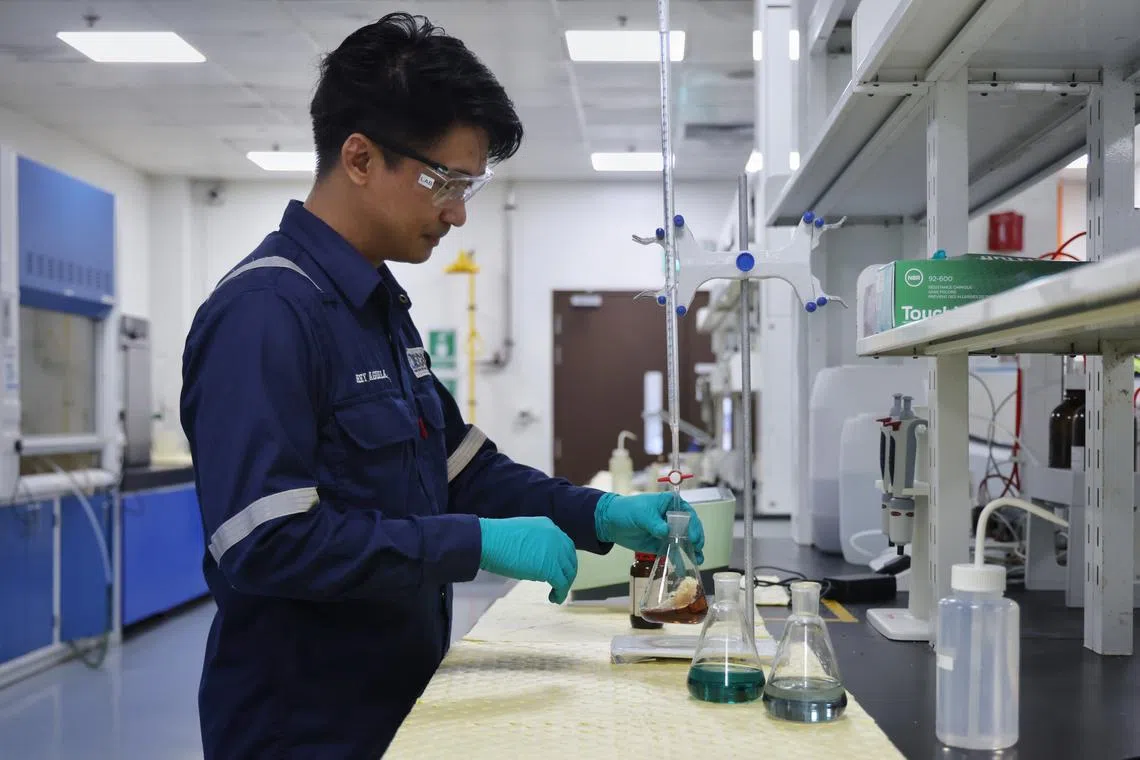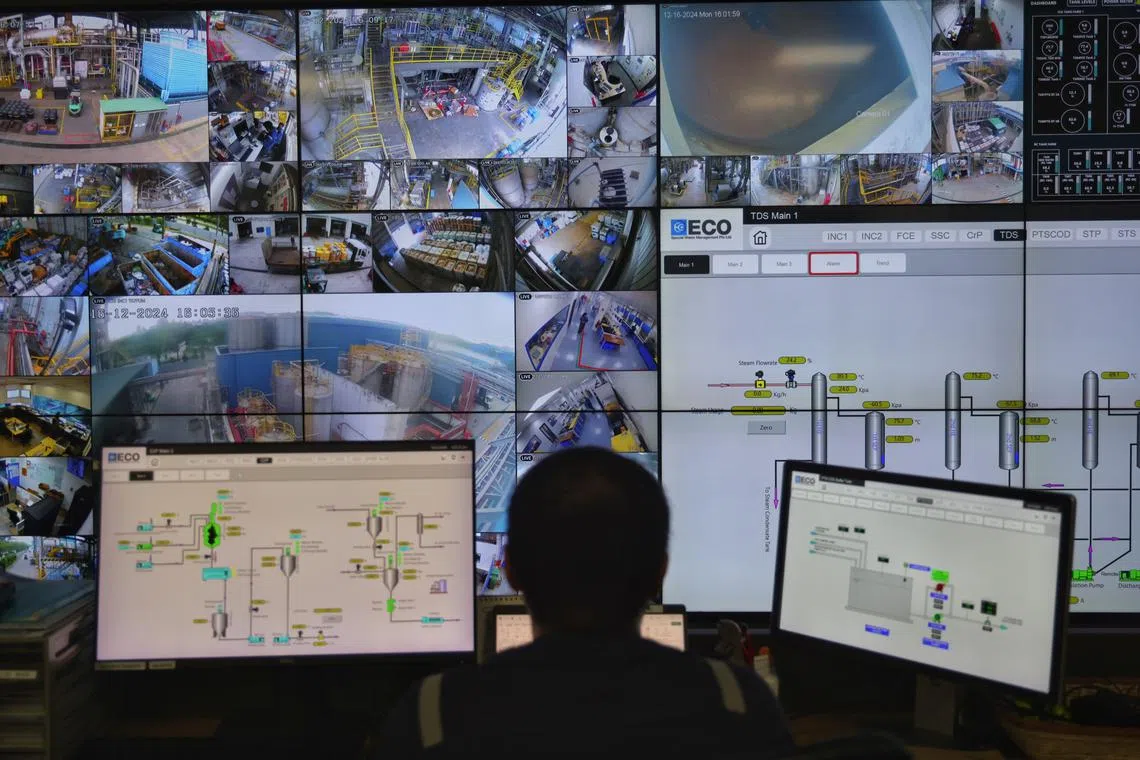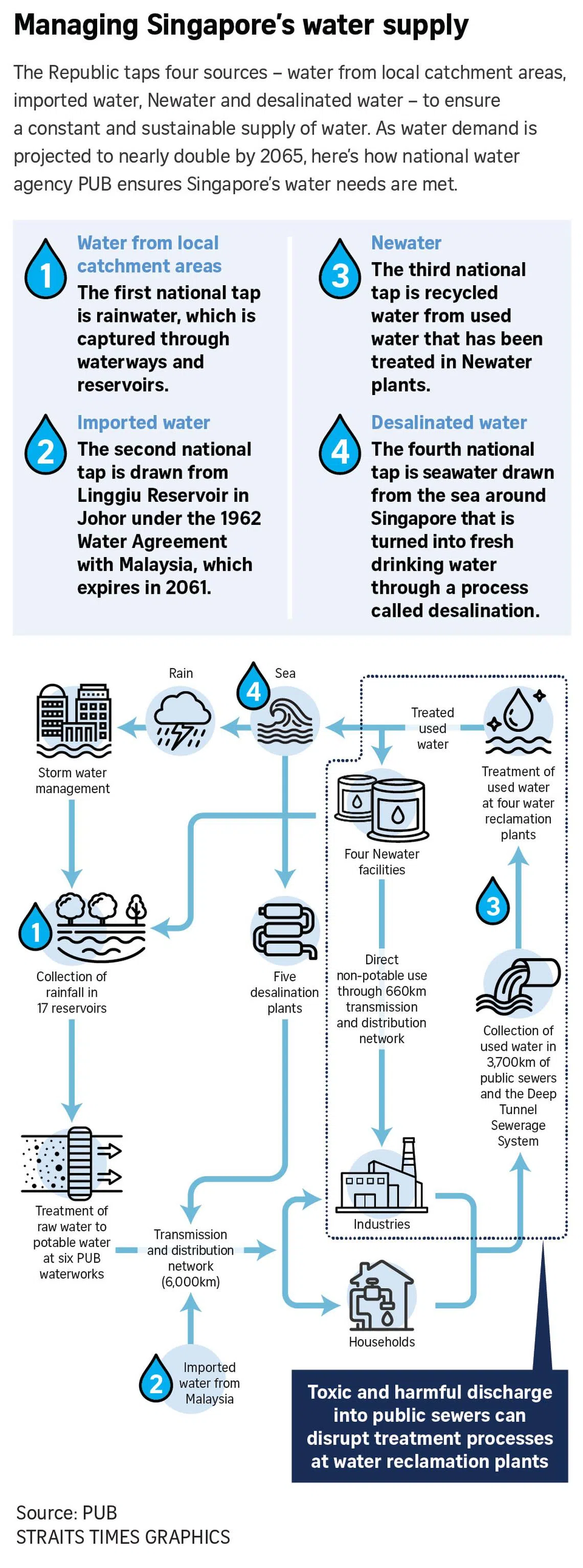Treating industrial wastewater more complex as manufacturing advances: Waste management firm
Sign up now: Get ST's newsletters delivered to your inbox

Waste sampling and testing at Eco Special Waste Management in Tuas.
ST PHOTO: JASON QUAH
SINGAPORE – Advancements in manufacturing have made industrial wastewater more complicated to treat, but proper treatment of such water is a critical pillar of Singapore’s water security, now strengthened by upcoming stricter regulations.
“It used to be easier to treat wastewater from industries… Waste streams have evolved and become more complex as materials used have become more unique,” said Mr Larry Cheong, business development director of waste management firm Eco Special Waste Management.
For example, industrial waste now may contain a higher variety of chemicals, which may warrant more complex treatment needed to remove them.
“Wastewater from pharmaceutical plants may have fluctuating pH levels or contain various sludges and solvents, which is inevitable,” Mr Cheong said.
The company on Dec 16 demonstrated to media some of the best practices to process industrial wastewater to ensure it is safe for disposal.
Toxic and harmful discharge into sewers can disrupt treatment processes at the water reclamation plants (WRPs). For instance, microbes used to treat used water at these plants may be killed.
The illegal discharge of volatile organic substances, such as benzene, can also pose a danger to workers who maintain the sewers and WRPs. They may inhale the toxic fumes, or the highly flammable substances may cause fires and explosions.
With amendments to the Sewerage and Drainage Act passed on Nov 11,
Minimum penalties will be introduced and maximum penalties raised. Repeat offenders will also face higher penalties.
For example, a company that discharges hazardous substances without PUB’s approval, causing injury to workers and damage to sewers, will face a new minimum fine of $40,000. The maximum penalty will be doubled from $200,000 now to $400,000.
With more dry spells expected as a result of climate change, the importance of recycling water in Singapore will grow, highlighting the need to further safeguard the quality of used water, Senior Minister of State for Sustainability and the Environment Amy Khor said in November in Parliament.
The Republic imports water in addition to collecting rainwater in reservoirs. Newater is said to be Singapore’s “third tap”.
Used water from industries and households is channelled by the public sewerage system to WRPs, which treat the used water before some is sent to Newater factories to produce recycled water.
“As Singapore’s economy and population grow, water demand is projected to nearly double by 2065,” said PUB on Dec 16. “Newater... plays a crucial role in meeting this demand and enhancing Singapore’s water security amid climate change.”
Between 2017 and 2023, PUB prosecuted 90 offenders for 295 effluent-related offences. About 70 per cent of those prosecuted each year were repeat offenders. PUB did not give more information on the industries of the repeat offenders when asked.
Factories which produce trade effluents can engage waste management specialists to process their wastewater to ensure that they are safe for disposal. One such specialist is Eco Special Waste Management.
Wastewater is transported to Eco Special Waste Management, where it is weighed before samples are tested to determine the chemical content. A treatment plan will then be drawn to decide how it will be treated.
During pre-treatment, wastewater may need to go through chemical processes to neutralise its pH as well as remove solid substances.
Next, dissolved solids such as salts are separated when the wastewater is put through an evaporation process.
This is followed by biological treatment, where microorganisms are used to remove organic waste in the wastewater.
Finally, the wastewater is filtered before it is released into a tank to test whether it is safe for disposal.
If deemed safe for discharge, the wastewater will be released to the sewer. Otherwise, the wastewater will have to be re-treated, depending on the waste it contains.

The central control room at Eco Special Waste Management.
ST PHOTO: JASON QUAH
PUB uses a network of water quality sensors to help monitor abnormalities and detect possible toxic waste in the sewer network.
For example, more than 100 remote monitoring units are placed around Singapore to detect volatile organic compounds.
When abnormalities are detected, officers will collect samples and send them to laboratories for further analysis.
Besides the changes in penalties, the recently amended Act will also require the installation of Global Positioning System, or GPS, devices on waste tankers of general waste collectors permitted by PUB to dispose of certain waste at WRPs.
This will allow PUB to promptly investigate illegal disposal of waste that is not allowed to go into sewers and follow up with the necessary enforcement action.
Changes to the Act will extend PUB’s powers to respond to non-construction activities and discharge into reservoirs.




